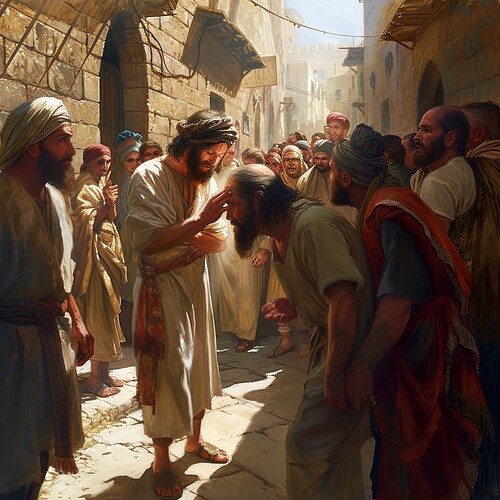 February 12: Mark 8: Feed Your Faith, Not Your Doubts
February 12: Mark 8: Feed Your Faith, Not Your Doubts
 Introduction: Facing Miracles and Misunderstandings
Introduction: Facing Miracles and Misunderstandings
Today’s chapter unveils a fascinating whirlwind of lessons, miracles, testing faiths, and prophecies. Mark 8 invites us into a spiritual journey where faith is tested, and belief systems receive a significant push.
 Jesus’ second miracle of feeding thousands: Offering abundant blessings unexpectedly
Jesus’ second miracle of feeding thousands: Offering abundant blessings unexpectedly
Jesus miraculously feeds four thousand people in a remote place using just a few loaves of bread and a handful of fish. This powerful event illustrates His ability to meet our needs, no matter how limited our resources might seem.
![]() Key Verse: "
Key Verse: "And they ate and were satisfied."- Mark 8:8
 The Pharisees seek a sign: Stepping forward despite skepticism
The Pharisees seek a sign: Stepping forward despite skepticism
The Pharisees test Jesus, asking Him for a sign from heaven, but Jesus responds with a stern rebuke. He condemns their relentless skepticism, refusing to offer miracles to those who demand them instead of seeking understanding.
![]() Key Verse: "
Key Verse: "Why does this generation seek a sign? Truly, I say to you, no sign will be given to this generation." - Mark 8:12
 The healing of a blind man: Experiencing miracle through faith
The healing of a blind man: Experiencing miracle through faith
Jesus heals a blind man in an unusual two-step process. The blind man first sees people “like trees, walking," before Jesus performs the second miracle, fully restoring his sight. This event underscores the progressive nature of spiritual growth and teaches us that faith, too, develops over time.
![]() Key Verse: "
Key Verse: "Then Jesus laid his hands on his eyes again; and he opened his eyes, his sight was restored, and he saw everything clearly." - Mark 8:25
 Key Themes and Reflections
Key Themes and Reflections
Miracles abound: This chapter emphasizes that miracles stem from faith in Jesus, even when circumstances seem overwhelming or impossible.
Progressive spiritual growth: Faith is not an overnight process. It needs time, as demonstrated by the healing of the blind man. Even if progress is slow, remember that growth is still happening.
 Today’s Application
Today’s Application
Times of doubt test our faith, just like the disciples questioned how Jesus would feed the crowd in the wilderness. It’s a reminder to feed our faith in God’s promise instead of feeding our doubts.
 Hidden Gem
Hidden Gem
Interesting to note that the miracle of the multiplication of the bread and fish takes place twice in Mark. The first time, the crowd was Jewish (Mark 6:32-44), and now the crowd is mostly Gentile (Mark 8:1-10). Both communities received the blessings of Jesus.
 Reflective Q&A
Reflective Q&A
![]() Why do you think Jesus performed the miracle of sight restoration in two stages?
Why do you think Jesus performed the miracle of sight restoration in two stages?
A: This unique healing may illustrate that our understanding of God and His ways is often progressive.
![]() What does Jesus’ refusal to give Pharisees a sign tell us about His character?
What does Jesus’ refusal to give Pharisees a sign tell us about His character?
A: Jesus is not interested in proving Himself to skeptics. He seeks genuine belief, not begrudging acceptance.
![]() How can this chapter’s teachings apply to your personal life?
How can this chapter’s teachings apply to your personal life?
 Join the Discussion
Join the Discussion
Reflect on Mark 8 and share your thoughts related to this passage. How have you experienced Jesus’ abundance in unexpected ways? And how can we help each other in times of doubt?
 See You Tomorrow in Mark 9
See You Tomorrow in Mark 9
As we continue exploring Jesus’ ministry, tomorrow we will delve intol Mark 9: Transfiguration, Healing, and Teachings. Stay blessed and see you there! Enjoy your spiritual journey with AIgniteScripture!
